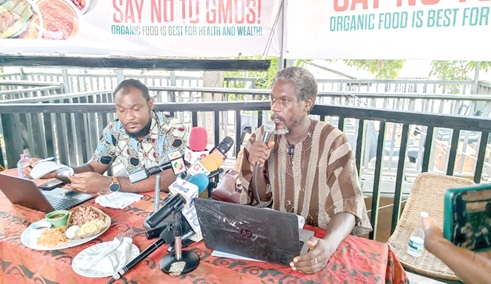
Reject genetically modified organisms - CSOs urge citizens
Food Sovereignty Ghana (FSG), along with 28 other civil society organisations, has called on citizens to oppose the recent approval of 14 genetically modified organisms (GMOs) by the National Biosafety Authority (NBA).
They expressed concern about the potential health risks, environmental impact and economic harm to Ghanaian farmers who cultivate organic crops. The NBA authorised the commercialisation of eight maize and six soybean GMO products "for the purposes of food, feed or processing".
Related Articles
A defining moment in Ghana’s GMO journey beckons
GMO to improve farmers incomes, food security - Dr Jerry
GMO crops will improve farmers' incomes, food security - Expert
No Ghanaian scientist will develop poison for Ghanaians to eat - Dr Ampadu-Ameyaw on GMOs
Use facts to take decisions on GMOs not emotions - Prof. Adu-Dapaah
The Communications Director of FSG, Edwin Kweku Andoh Baffour, demanded a nationwide education campaign before GMOs were allowed to enter the food system. This was contained in a joint statement signed by the various CSOs, including PFAG, the General Agricultural Workers Union (GAWU), the Centre for Indigenous Knowledge and Organisational Development (CIKOD), ActionAid Ghana, Rastafari Council of Ghana (RCG), and the Vegetarian Association of Ghana.
Others were Vibrant Vegan Society of Ghana (VVSOG), the Centre for Climate Change and Food Security (CCCFS), the Ghana Journalists for Environment, Science, Health and Agriculture (GJESHA), Sankofa Vegan Society of Ghana, Sankofa Health Movement, the Socialist Movement of Ghana (SMG), the Ghana Diaspora Coalition and the Ghana Food Movement.
The rest were Organic Restoration Village Farm, All African People's Revolutionary Party (AAPRP), Economic Fighters League, Eco-Conscious Citizens, AROCHA Ghana, TRAX, Comité Ouest Africaine des Semmances Paysannes (COASP), African Centre for Biodiversity (ACB), Global Eco Village, GRAIN, Youth Volunteers for Environment Ghana, Institute for Sustainable Energy and Environmental Solutions and Agricultural Technical Institute.
Consequences
The director said the people had the right to understand its potential consequences, adding that approved GMOs could unintentionally contaminate the food supply system. "We feel the people do not deserve to be eating GMOs, regardless of whether it is grown in Ghana or imported," he said.
Mr Baffour raised concerns about cross-contamination, highlighting the possibility of GM seeds germinating and jeopardising the country's local varieties. He urged the NBA to disclose details of the approval process and any public engagement regarding GMOs.
The director further advocated mandatory labeling of GM products to enable consumers to make informed choices. He also called for support for traditional agriculture, such as the establishment of irrigation facilities, credit access to farmers and infrastructure development.
Concerns
The Peasant Farmers Association of Ghana (PFAG) compared the approval of GMOs to legalising illegal mining. The Programmes Officer of the association, Bismark Owusu Nortey, questioned the need for GMOs, given that there was maize and soybean surplus in the country.
A representative from the Economic Fighters League, Nii Anyetei, urged the government to support farmers with infrastructure such as warehouses and improved market access rather than rushing to adopt GMOs.
The Ministry of Food and Agriculture (MoFA), in a statement issued in Accra last Friday, said the approval did not extend to using GMOs as seeds in the country.
